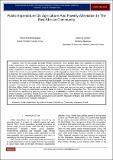| dc.contributor.author | Phoebe Mshai Mwasagua, Alphonce Odondo, Destaings Nyongesa | |
| dc.date.accessioned | 2020-08-25T10:42:34Z | |
| dc.date.available | 2020-08-25T10:42:34Z | |
| dc.date.issued | 2018-10-10 | |
| dc.identifier.uri | https://repository.maseno.ac.ke/handle/123456789/2374 | |
| dc.description.abstract | Over the last decade, the East African Community (EAC) partner states have sustained an increase in
public expenditures. The underlying debate is the belief that budgetary expansion creates economic opportunities which
translate in reduced poverty. However, Uganda, Tanzania and Burundi maintained lower average rates of increase in
public expenditure compared to Kenya and Rwanda but realized more poverty reduction. This raises the question as to
whether there exists any perceptible relationship between public expenditure and poverty. Therefore, this research sought
to determine the relationship between public expenditure on agriculture and poverty in EAC. Consumption per capita was
the proxy measure for poverty. The study was based on the Keynesian Macroeconomic theory which posits that an
increase in public spending increases economic growth and reduces poverty. In order to measure the relationship between
the variables, the study employed the correlational research design. The study used panel econometric data sourced from
the economic surveys of the individual East African Countries between the year 2000 to 2015, i.e., from the year of
inception. The Hausman test was used to determine the appropriateness of the FEM (Fixed Effects Model) or the REM
(Random Effects Model) and the study settled on the latter. A panel unit root test was used to conduct the variables’
stationarity. The long-run relationship was tested using the Pedroni Residual Cointegration Test. The results indicated
that (GEA) was significant in lowering poverty levels (α_1=0.00000008; p=0.0404). The study, therefore, concluded that
greater budgetary expenditure should focus more on the agricultural sector. These findings may contribute to the existing
pool of knowledge on public spending consequences and poverty reduction strategies and benefit policymakers by
providing a framework for budgetary allocations. | en_US |
| dc.publisher | IJRAS | en_US |
| dc.subject | Public expenditure, Agriculture, Poverty, East African Community, Keynesian, Panel | en_US |
| dc.title | Public Expenditure On Agriculture And Poverty Alleviation In The East African Community | en_US |
| dc.type | Article | en_US |

